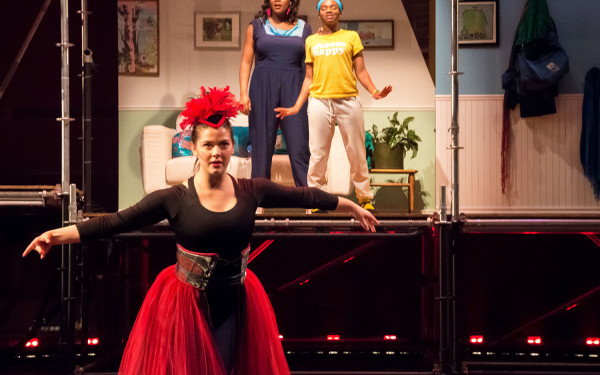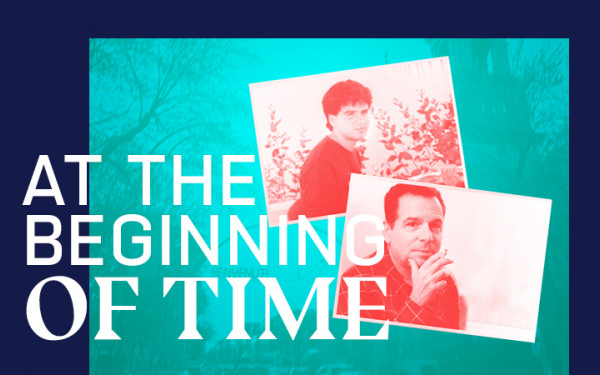Electric Guitar, Black Music History, Time Travel, and Opera, Oh My!
Ambitious Backstage at Carnegie Hall: An Opera About Racism and the Electric Guitar Makes Its Debut
Backstage at Carnegie Hall made its debut at Centaur Theatre on Sept. 23..
The latest work by electric guitar extraordinaire—and Concordia graduate—Tim Brady and his eponymous music ensemble Bradyworks follows iconic jazz guitarist Charlie Christian (Ruben Brutus). Minutes before a performance at Carnegie Hall with the Benny Goodman sextet in 1939, Charlie suffers a panic attack and meets a mystical time traveler [Alicia Ault], who launches him on a journey through past and future, encountering Montreal’s first Black club owner Rufus Rockhead, opera singer Marian Anderson, a 2014 BLM protest in Toronto, the founder of Gibson Guitars and Charlie’s deceased father.
Though he doesn’t remember the exact origins of Backstage at Carnegie Hall, composer and artistic director, Brady, has long been a Christian connoisseur, having played electric guitar for 50 years.
Brady was also inspired by his father, who once made work permits for the American musicians who performed at Rockhead’s Paradise. He’d regale his son with stories from the club, which received artists including Louis Armstrong, Nina Simone, Sammy Davis Jr., Billie Holiday and Ella Fitzgerald before its demise.
According to its playbill, Backstage at Carnegie Hall promises to explore “the individual and social cost of racism.” and to “examine the impact of generations of racial and class-based trauma and the role of music in evolving discussions about racism.”
To bring to life a story centered on important Black musicians and tackle racism, Brady reached out to Black Theater Workshop, which put him in touch with playwright and first-time librettist Audrey Dwyer.
While Backstage at Carnegie Hall deviates from many traditional opera norms, it certainly delivers on the camp thanks to its use of time travel, some awkward enunciation, and Benny Goodman (Clayton Kennedy) breaking the fourth wall to talk to conductor Véronique Lussier.
It is a joy to see Christian meet contralto Marian Anderson (Frédéricka Petit-Homme), an important figure in the fight to desegregate artistic spaces, as she sings about the importance of joy in music and “Black boy joy.” The number sounds like Dwyer’s acknowledgment of how much Black representation focuses on suffering and trauma. This number might have felt more satisfying if the opera were to end with the audience being able to see Charlie finally perform at Carnegie Hall. Instead, the show closes with Charlie walking onto its stage..
As an opera about the electric guitar, the instrument plays a surprisingly subtle role in the ensemble, which veers towards the haunting and the melancholic rather than the rocking. Still, the music maintains exciting, experimental, dramatic flourishes, and plays well with the voices of leads Brutus and Ault.
There’s a satisfying contrast between their voices: Ault’s more classic musical theater opera style versus Brutus, who has a background in gospel and jazz vocals before he was motivated to continue his vocal training through opera.
“What motivated me to make sure I got into this project was the fact that opera is more of an elite form, it's not accessible. So writing subject matters that go against the grain of the people who go see these shows, I would say is a definite opening. It's a change, it's moving forward, it's evolution,” said Brutus. He then compared Backstage at Carnegie Hall to the 1935 opera Porgy and Bess, which featured a Black cast, saying it was made to give Black people access to a historically elite and white art form.
During an interview with The Link, Brutus said to Brady, “The fact that you're using opera as a medium to say this, I think you get it a louder voice because if this was a musical, I don't think it would get as much traction.”
Though certain elements could alienate Backstage at Carnegie Hall from opera, its ambition roots it firmly within the genre. As if the opera wasn’t ambitious enough on its own, this is only the first production in what’s intended by Brady to be a four-part cycle called Hope (and the Dark Matter of History). Future installments will feature the time traveler character and promise to tackle abortion rights, climate change, and artificial intelligence.
Brady explained that, “I realized there was a very fertile artistic territory and dealing with a time traveler, and I wanted to do more than one opera with a time zone. So I took these other ideas and formed them into what I hope will be a coherent cycle.”
Most people are unfamiliar with opera, but with the premise of Backstage at Carnegie Hall, Brutus predicted that, “I think we're gonna have a real mix. I hope so. Classical people are going to come and non-classical people are going to come and opera goers are going to come. Some of them are gonna love it, some will hate it. As long as they don’t leave indifferent, I’m okay.”




_600_375_90_s_c1.jpg)


_600_375_90_s_c1.jpg)